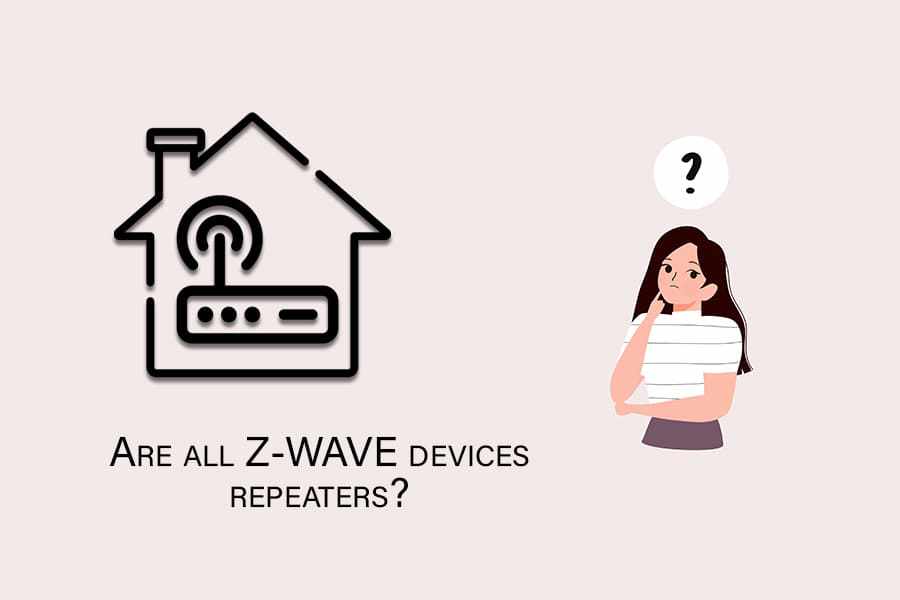Do you want to know – are all Z-Wave Devices Repeaters or not? Then check out this guide to know all about Z-Wave Repeaters.
What is a Z-Wave Repeater?
Repeater means any Z-Wave or ZigBee device that always remains powered-on. For instance, the Samsung SmartThings.
It acts as a relay point to enable a device placed too far from the hub to communicate to a close repeater. Hence. The repeater transmits the message back and forth to the hub.
Z-Wave signal repeater is a powerful and compact device that extends the Z-Wave mesh network of your smart home.
It is perfect for enhancing the overall signal strength between smart devices placed at a distance from one another.
Do Z-wave repeaters work?
Quite Good. The Z-Wave system operates on a mesh network that means you’ll have devices to act as signal repeaters to enable strong signals amongst the devices that are placed far away from the smart home hub.
This system allows for devices to connect with the Z-Wave network without any issues. If you face problems with the performance of the Z-Wave mesh network, you can add Z-Wave signal repeaters to it for a better communication system.
Z-Wave generally offers a range of 100 meters. Some of your devices do not possess a clean line of sight with the hub. Hence, the range might be lower.
This is where Z-Wave signal repeaters play their role, enabling repeat signals for 30 meters to 100 meters.
Are all Z-Wave Devices Repeaters?
Not exactly. Mostly main-powered devices with built-in ZigBee or Z-Wave radio act as repeaters. The only devices that don’t act as signal repeaters are security alert devices such as smoke alarms.
These devices need to stay focused on their essential function, and hence they do not repeat signals for other devices.
Also, Z-Wave devices act as signal repeaters only for other Z-Wave devices through similar Z-Wave frequencies. On the other hand, Z-Wave repeaters come with a significantly greater range than the classic one.
In the latest generation of smart home devices, all main-powered Z-Wave and Zigbee devices will act as signal repeaters, except for emergency alert devices such as smoke detectors.
So the answer to your question – Are all Z-Wave Devices Repeaters? is that it depends on the devices.
Do Z-wave switches act as repeaters?
Yes. Mostly main-powered devices with built-in ZigBee or Z-Wave radio act as repeaters. The only devices that don’t act as signal repeaters are security alert devices such as smoke alarms.
These devices need to stay focused on their essential function, and hence they do not repeat signals for other devices.
“Auxiliary” or “Add on” light switches with no in-built radio will not act as signal repeaters even if they are hard-wired. Also, battery-powered devices do not work as repeaters.
Why do you need a Z-Wave Repeater?
Repeaters are great signal mediators. Each carrier can reach a specific distance and then transmit the message to the next carrier to carry on to the next device in the pathway.
Any repeater device can only carry a message for 40 feet from the point where it is placed. It has nothing to do with devices that are placed further away.
At the end of those 40 feet, it will transmit the message to another repeating device or the hub. Hence, you will require one repeater for the Z wave about every 40 feet.
On the other hand, if you have a Z-Wave plus signal repeater then that will give an even greater range, i.e., 60 feet.
Also, Z-Wave Plus devices repeat signals only for another classic Z-Wave device.
Are all Z-Wave Devices Repeaters: Conclusion
All in all, repeaters act as a mediator that passes on messages from one area to another, making your smart home security system more robust and reliable.
The best part is that almost all Z-Wave devices can act as a repeater, so you don’t have to invest in them individually.
